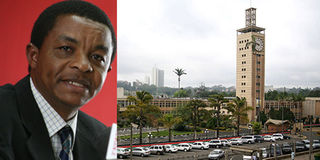Kenyan MPs may lose assets over tax arrears

Photos/HEZRON NJOROGE and FILE
Commissioner for Domestic Taxes John Njiraini on June 22, 2011 said KRA has given the affected officials, and their employers, until mid-July to pay up. In total, KRA expects to collect Sh700 million excluding penalty as the accrued tax and going forward nearly Sh1 billion every year from MPs and the 11 constitutional offices.
The Kenya Revenue Authority will auction the property of MPs and other top government officials if they don’t pay their taxes.
Their bank accounts could also be seized and money recovered.
The no-nonsense position taken by the taxman means that the tax-free existence that MPs have fought so hard to keep is almost coming to an end.
MPs’ tax holiday, through which they pay income tax on only Sh200,000 of their Sh850,000 salaries, is hugely unpopular with the public.
Other public officials who are joining the ranks of taxpayers include the Attorney General, judges, Controller and Auditor General, chairman and members of the Public Service Commission and Interim Independent Electoral Commission chairman and commissioners.
The Constitution explicitly provides that no public official is to be exempted from paying taxes. From the moment it became law on August 27 last year, the incomes of constitutional office holders became taxable.
KRA has given the affected officials, and their employers, until mid-July to pay up. If they don’t, enforcement measures will be taken to recover the money, warned Mr John Njiraini, the Commissioner for Domestic Taxes.
The taxman, however, said he did not expect matters to degenerate to that level. “The other measures we have to recover the money include doing so through the affected person’s bank accounts. But we hope for an amicable solution to this,” he said.
Deputy Speaker Farah Maalim supported the decision to demand the taxes. “MPs have no choice but to pay taxes… the law is very clear. It does not exempt them from paying taxes,” he said in Nairobi on Wednesday.
The Judiciary is already in touch with KRA and has asked to be guided to comply with the law. “We expect Parliament and the other relevant authorities to respond to our demands the soonest possible,” said Mr Njiraini.
KRA is challenging MPs who are unhappy with its interpretation of the law to go to the Supreme Court.
MPs have been arguing that taxing them would cut their pay in violation of their employment contract with the public.
They also say that they have obligations such as loans and mortgages, which they took on the basis of their full untaxed pay.
Only two MPs have been paying tax — Mr Peter Kenneth and Mr Johnstone Muthama — while the rest have only been paying tax on their basic salary of nearly Sh200,000.
In total, KRA expects to collect Sh700 million excluding penalty as the accrued tax and going forward nearly Sh1 billion every year from MPs and the 11 constitutional offices.
MPs’ taxable monthly perks include responsibility, constituency, extraneous, entertainment, sitting and the Sh336,000 for owning a car.
“Even the motor vehicle purchase allowance of Sh3.3 million will now be subjected to taxation,” said Mr Njiraini.
In July last year, Attorney General Amos Wako told MPs that under the new Constitution they would not be expected to pay taxes until the end of their term in office as they were exempted under the transitional clauses.
Mr Njiraini on Wednesday said that after consultation with Constitution Implementation Commission (CIC), they agreed that Article 210 of the Constitution was not subject to deferral despite the AG’s earlier opinion.
CIC chairman Charles Nyachae has supported the decision to immediately tax MPs and other constitutional office bearers. (READ: Nyachae backs MPs tax move)
In CIC’s view, the section on the taxation of MPs became operational the moment the Constitution came into force.
“There are many state officers. It is not just MPs. They all have to pay tax as none of them shall be exempted.
“The opinion of a State department is not superior to an interpretation by an institution mandated to oversee the implementation of the new constitution,” said Mr Njiraini.
The MPs may have been told what they wanted to hear at the time to gain their support at the referendum after some of them threatened to oppose the Constitution if they were to be taxed thereafter.
Early this month KRA wrote to Treasury—which runs the kitty from which most constitution office holders are paid — asking it to tax the salaries of the officers.




